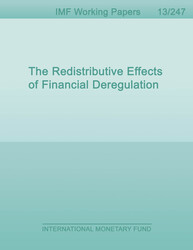
The Redistributive Effects of Financial Deregulation
WP/13/247
Financial regulation is often framed as a question of economic efficiency. This paper, by contrast, puts the distributive implications of financial regulation center stage. We develop a model in which the financial sector benefits from risk-taking by earning greater expected returns. However, risktaking also increases the incidence of large losses that lead to credit crunches and impose negative externalities on the real economy. We describe a Pareto frontier along which different levels of risktaking map into different levels of welfare for the two parties. A regulator has to trade off efficiencyin the financial sector, which is aided by deregulation, against efficiency in the real economy, which is aided by tighter regulation and a more stable supply of credit. We also show that financial innovation, asymmetric compensation schemes, concentration in the banking system, and bailout expectations enable or encourage greater risk-taking and allocate greater surplus to the financial sector at the expense of the rest of the economy.
Publication date: December 2013
ISBN: 9781475546088
$18.00
Add to Cart by clicking price of the language and format you'd like to purchase
Available Languages and Formats
| English |
Prices in red indicate formats that are not yet available but are forthcoming.
Topics covered in this book
This title contains information about the following subjects.
Click on a subject if you would like to see other titles with the same subjects.
Financial Regulation , Distributive Conflict , Rent Extraction , Growth of the Financial Sector
Summary
Copyright © 2010 - 2024
Powered by:
AIDC



